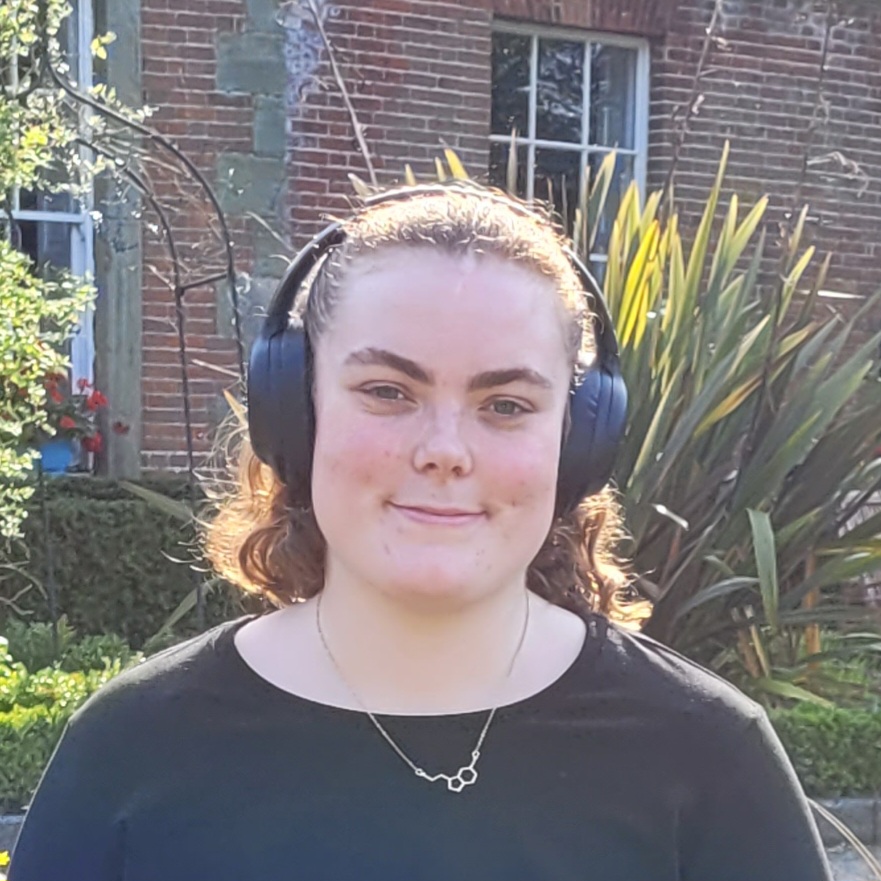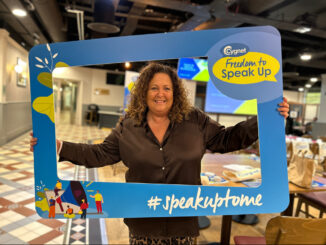
Flo is a 22-year-old service user from Cygnet Elms, a high dependency complex care service run by Cygnet Health Care for those with learning disabilities, associated complex needs who may have behaviours that challenge.
Flo was diagnosed with autism when they were 18-years-old and this World Autism Acceptance Week, they talk about what is to like to live with autism, both the challenges and the benefits, and how they want to live in a world where differences are embraced and celebrated.
1. What symptoms were you showing which led to a diagnosis?
I had been experiencing mental health difficulties since a young age and was under the care of the children’s community mental health services. I had been given many diagnoses including selective mutism and social anxiety due to my difficulty talking and coping with social situations. I also struggled with very high levels of anxiety all the time and was generally struggling to cope with life.
By chance, I got a new psychiatrist who happened to have a better understanding of autism who recognised that many of my difficulties were actually autistic traits and I was then diagnosed with ASD.
2.Can you explain how you felt about receiving the diagnosis?
Do you feel differently about yourself and has it changed how other people treat or respond to you?
When my psychiatrist first mentioned autism to me, I thought I couldn’t possibly be autistic. Like most people, I had only ever heard the stereotypes about autism, and I didn’t fit them. For example, I’d heard that autistic people lack empathy, which definitely didn’t apply to me; if anything I’ve always felt things more deeply than other people. But I went away and did some research and I learnt that that’s actually very common for autistic people.
In the following years I continued to research and realised that everything I thought I knew about autism was wrong. I found so many autistic people talking about experiences that I related to and I was able to make sense of my life. Up until then I’d spent my whole life feeling like a problem. I didn’t fit in, I’d always struggled with things that other people didn’t, and even mental health services didn’t seem to be able to help me. Finding this community of autistic people helped me realise that there wasn’t something wrong with me, being autistic isn’t a bad thing, and I began to embrace my autistic identity.
Being undiagnosed meant I went my entire life without having my needs met which caused so many problems. Understanding my autism has helped me learn how to accommodate myself, and helped others accommodate me. Things are still really difficult, but I can make sense of my experiences, and find ways to make day to day life a little bit easier. My family, friends and staff at Cygnet Elms also understand me more now and know how to help me better.
3. Do you think people are understanding of autism or are there still common misconceptions?
There are still a lot of misconceptions about autism that are very ingrained into our society. I think very few people have a proper understanding of what autism is, people mainly just know the stereotypes that we see in the media which do not reflect the autistic community as a whole.
There are also a lot of misunderstandings of what it means when we say autism is a spectrum. When people hear this they think it means it goes from mild autism to severe autism. But in actual fact, it’s more like colour wheel, that all autistic people lie in, each with different needs in different areas.
In the same way, terms like low functioning and high functioning are often used to describe autistic people, but they’re actually very inaccurate terms. Everyone’s functioning level varies massively day to day depending on so many different factors. And these terms can be very harmful. The term low functioning is often used to deny people autonomy, and treat them as less than. And the term high functioning is often used to deny people the support they need and dismiss their struggles.
Autism is generally seen in a very deficits focussed way, as a problem that needs to be fixed. But autistic people don’t need to be fixed, we need to be accepted, understood and provided with the support and accommodations we need.
4. How does living with autism affect your daily life?
Social situations are really anxiety provoking for me; the social rules that everyone else intuitively knows don’t come naturally to me. So when I’m talking with someone I have to think about so many things like their body language and tone of voice and work out what they mean. I have to consciously regulate my own body language and tone of voice etc. so people don’t misunderstand me. I can find some things hard to understand, like metaphors, vague language, and abstract concepts. After every interaction, I go over and over it in my head trying to understand what someone meant, and work out if I made any social mistakes. It’s very stressful.
I also have a lot of sensory issues that can make day to day life really difficult. I find noise very overwhelming as well as bright lights and certain smells. I also really struggle with sensory issues around clothing, I can only wear certain types of clothes and I can’t wear short sleeves because it’s like I can feel every molecule touching my skin and it completely overwhelms me. My sensory issues also cause me to have really bad temperature regulation. I get overheated so easily which I find very overwhelming.
Dealing with change is also difficult for me so I have quite a fixed routine and tend to want to keep things the same. When things change it can make me feel very anxious and out of control. I also struggle with decision making and dealing with expectations and demands because they cause me a lot of anxiety.
All of these things can make life really overwhelming for me and make it hard to cope. I get really burnt out from the stress that all of these things cause me.
5. What changes are put in place to help you?
I can find talking really difficult; it causes me a lot of anxiety. And when I get really anxious or upset I struggle to get my words out. To help with this I use communication cards, and I often write down what I want to say instead of saying it verbally. Especially when I’m talking about how I’m feeling as I find that particularly difficult.
6. What are the challenges of living with autism?
One of the hardest things is dealing with how other people treat me because of my autism. I’ve spent my whole life being misunderstood and treated badly by others because I’m different. From a young age I realised that my authentic way of being wasn’t accepted, so I started masking to try to fit in to avoid being treated badly. This included mimicking behaviour, using learnt social scripts, covering up autistic traits like stimming, and forcing myself to do things that cause me pain like eye contact. For me masking has meant completely rewiring core parts of myself and has been isolating, exhausting and caused me to really struggle with my mental health.
Another challenge is living in a world that isn’t made for me. Everyday life is so much harder when you have additional needs because our society just isn’t set up to cater to them. Autistic people have to fight to get the accommodations and support that we need and it’s tiring constantly having to advocate for yourself.
7. What are the benefits to living with autism?
Despite the difficulties that come with it, there are so many things that I love about being autistic. My autism is what makes me who I am. It’s the reason for a lot of my difficulties, but it’s also the reason for my strengths.
Autistic people often have intense areas of interest known as special interests. I love how passionate I am about my special interests and they help me cope with life and find a sense of identity.
I also like how I see things differently to other people. I see patterns and notice details other people don’t, I see through the social rules and expectations and I have a strong sense of justice. I want a better world and I do what I can to make that happen.
I feel things very deeply which can be overwhelming but it also makes me kind and accepting of others and means I love very deeply too.
On my journey of accepting my authentic, autistic self, I am learning to find beauty in the things about me that other people think are weird. I’m trying to love myself for my differences, not despite of them.
8. What’s one thing you want to people to know about autism?
I want people to know that our differences are beautiful and wonderful and something to be embraced. We live in a world where differences are seen as a negative thing, and autistic people are treated really badly as a result of that. One thing you can do as an individual to help with this is to really work on your acceptance of people who behave differently to the norm. And that’s not just about accepting people you know to be autistic; it’s about really challenging those internal biases we all have that come up when we see someone who doesn’t fit into society’s little box. If everyone put the work into that it could really make a difference.
9. Describe the best thing about Cygnet Elms
Cygnet Elms has given me a safe space where I’ve been able to learn about myself and understand myself. Coming here and receiving proper care and developing good relationships with staff where I can properly open up has been really important for me.
Speech and language therapy has really helped me be more assertive and learn how to advocate for myself and others. Is also helped me learn how to express my feelings and understand social interactions. And occupational therapy has helped me understand and accommodate my sensory issues.
As well as my personal journey, I’ve been using my experiences to try to improve things for other autistic people so others don’t have to experience what I have. And the staff at Cygnet Elms have been so encouraging of all the work I’ve been doing and have supported me in any way they can.



